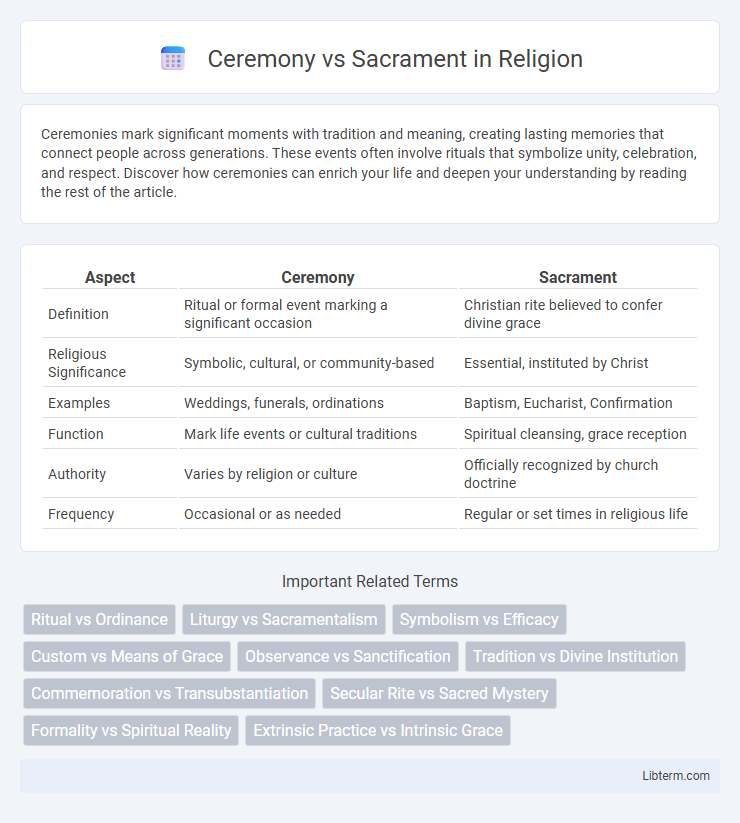Ceremonies mark significant moments with tradition and meaning, creating lasting memories that connect people across generations. These events often involve rituals that symbolize unity, celebration, and respect. Discover how ceremonies can enrich your life and deepen your understanding by reading the rest of the article.
Table of Comparison
| Aspect | Ceremony | Sacrament |
|---|---|---|
| Definition | Ritual or formal event marking a significant occasion | Christian rite believed to confer divine grace |
| Religious Significance | Symbolic, cultural, or community-based | Essential, instituted by Christ |
| Examples | Weddings, funerals, ordinations | Baptism, Eucharist, Confirmation |
| Function | Mark life events or cultural traditions | Spiritual cleansing, grace reception |
| Authority | Varies by religion or culture | Officially recognized by church doctrine |
| Frequency | Occasional or as needed | Regular or set times in religious life |
Defining Ceremony and Sacrament
Ceremony refers to a formal event or ritual performed according to established customs or traditions, often marking significant occasions without necessarily involving a spiritual or divine element. Sacrament is a sacred religious rite recognized as an outward and visible sign of inward and spiritual grace, instituted by Christ and essential to Christian faith and practice. While ceremonies can be secular or religious, sacraments specifically convey divine grace and spiritual transformation.
Historical Origins of Ceremonies and Sacraments
Ceremonies have ancient origins rooted in cultural, religious, and social practices, often serving as communal rituals marking significant life events or seasonal cycles. Sacraments, particularly within Christian traditions, emerge from theological developments that defined specific rites as manifestations of divine grace instituted by Christ, such as Baptism and the Eucharist. The historical evolution distinguishes ceremonies as broad ritualistic customs, while sacraments function as sacred, doctrinally significant rites integral to ecclesiastical authority and spiritual salvation.
Core Differences Between Ceremony and Sacrament
Ceremony involves a formal event or ritual conducted to mark significant occasions, often cultural or social, without inherent spiritual grace or divine authority. Sacrament is a sacred rite recognized by religious institutions as a means of imparting divine grace and symbolizing a believer's faith and spiritual commitment. Core differences emphasize that ceremonies are primarily symbolic social practices, while sacraments hold theological significance and are considered essential for spiritual life within specific faith traditions.
Theological Significance of Sacraments
Sacraments hold profound theological significance as they are considered outward and visible signs of inward and spiritual grace, instituted by Christ to convey divine life to believers. Unlike ceremonies, which are often symbolic or cultural rituals, sacraments possess an intrinsic spiritual efficacy that sanctifies and transforms the recipient according to Christian doctrine. The seven sacraments in Catholic theology--Baptism, Eucharist, Confirmation, Reconciliation, Anointing of the Sick, Holy Orders, and Matrimony--serve as essential channels of grace fundamental to salvation and spiritual growth.
Cultural Roles of Ceremonies
Ceremonies serve as structured cultural rituals that reinforce social bonds, mark significant life events, and transmit communal values across generations. Unlike sacraments, which are religious rites believed to convey divine grace, ceremonies often encompass secular practices such as weddings, graduations, and national celebrations. These cultural ceremonies play a vital role in identity formation, social cohesion, and the preservation of collective heritage within diverse communities.
Symbolism in Ceremonies and Sacraments
Ceremonies employ symbolic actions and objects to represent cultural or religious meanings, often emphasizing community participation and tradition. Sacraments are sacred rites instituted by a religious authority, embodying divine grace through specific symbols like water in baptism or bread and wine in the Eucharist. The symbolism in sacraments serves as a tangible conduit for spiritual transformation and covenant with the divine.
Ritual Practices: A Comparative Overview
Ceremonies often encompass a broad range of ritual practices that mark significant social or cultural events, while sacraments are specific religious rites believed to convey divine grace within Christian traditions, such as baptism and Eucharist. Ritual practices in ceremonies can vary widely from community to community or culture to culture, often including symbolic actions, music, and communal participation without necessarily implying spiritual efficacy. Sacraments are universally recognized within particular denominations like Catholicism, Eastern Orthodoxy, and some Protestant churches, where ritual elements such as the use of water in baptism or bread and wine in Eucharist hold theological significance beyond mere symbolic gestures.
Ceremonies in Different World Religions
Ceremonies across world religions serve as symbolic acts that reinforce faith, community, and spirituality, varying widely in ritual and significance. In Hinduism, ceremonies like puja involve offerings to deities to invoke blessings, while in Buddhism, rituals such as meditation ceremonies mark significant spiritual milestones. Christianity's ceremonies, distinct from sacraments, often include liturgies and festivals that commemorate biblical events, reflecting diverse cultural practices within the faith.
The Impact of Sacraments on Believers’ Lives
Sacraments profoundly influence believers by serving as tangible signs of divine grace, fostering spiritual growth and deepening their relationship with God. Through rituals such as baptism and Eucharist, sacraments provide moments of sacred encounter, reinforcing faith and community belonging. The transformative power of sacraments often leads to lasting moral and ethical commitment, shaping believers' daily lives and spiritual journeys.
Modern Perspectives on Ceremony and Sacrament
Modern perspectives on ceremony emphasize cultural expression and community identity, often viewing ceremonies as adaptable rituals that foster social cohesion and personal meaning. Sacraments, in contrast, are regarded predominantly within religious contexts as sacred rites established by divine authority, conveying spiritual grace and profound theological significance. Contemporary discourse highlights the evolving interplay between sacred sacraments and secular ceremonies, reflecting shifts in societal values and pluralistic spiritual practices.
Ceremony Infographic

 libterm.com
libterm.com